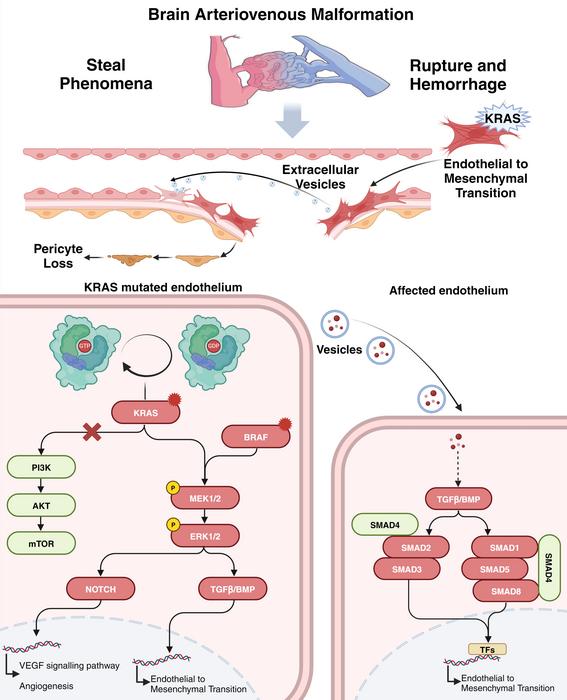Cerebral vascular malformations (CVMs), such as cerebral arteriovenous malformations (AVMs) and cavernous malformations (CCMs), are well-documented for their complex origins and the significant challenges they pose in clinical settings. Recent advancements in genetic and molecular research have shifted the paradigm, reframing these conditions as diseases driven by underlying genetic mutations rather than mere congenital structural anomalies. This approach stands to change how clinicians understand and treat patients suffering from these potentially life-threatening vascular conditions.
A comprehensive review conducted by experts at Beijing Tiantan Hospital elucidates the intricate mechanisms associated with CVMs, particularly emphasizing the role of specific somatic mutations. Among these mutations, KRAS, BRAF, and PIK3CA have emerged as pivotal players in the pathogenesis of both AVMs and CCMs. This finding is critical, as it suggests that these malformations are not solely the result of aberrant vascular development, but rather the consequence of specific genetic alterations that can be identified and potentially targeted with innovative therapies.
The review highlights groundbreaking diagnostic techniques such as next-generation sequencing and advanced imaging genomics, which allow for the detection of these key mutations in patients. Such methods enable a more nuanced understanding of the genetic landscape of CVMs, facilitating the identification of patients who may benefit from targeted therapies. Given the shortcomings of conventional treatment options, integrating these advanced genetic insights into clinical practice stands to revolutionize outcomes for affected individuals.
Importantly, the study sheds light on the signaling pathways activated by mutations like KRAS. The data indicates that KRAS mutations in endothelial cells trigger the MEK/ERK pathway, fostering processes such as endothelial-to-mesenchymal transition (EndMT), angiogenesis, and the loss of pericytes—each crucial to the proliferation of AVMs. Furthermore, these mutated cells exhibit an ability to release vesicles that influence normal endothelial cells, raising questions about how these interactions might promote disease progression.
The implications of these findings extend beyond understanding disease mechanisms; they open avenues for the exploration of targeted therapies. Current research points towards promising treatments such as MEK inhibitors and mTOR inhibitors, which could serve as effective alternatives to traditional surgical interventions. The potential for pharmacological options reflects a much-needed shift in the management of CVMs, moving from invasive and often risky procedures towards more refined, individualized treatment strategies.
Beyond drug therapies, the study also discusses innovative monitoring techniques, such as liquid biopsies and endovascular sampling, to dynamically assess the status of CVMs. This continuous monitoring is crucial for early intervention, allowing physicians to adapt treatment plans to the evolving nature of the disease. The integration of artificial intelligence into genomic analysis also holds significant promise, potentially refining imaging techniques and enhancing the overall efficiency of diagnosis and monitoring.
Dr. Yong Cao, one of the lead authors of the review, emphasizes the transformative potential of these advancements. He articulates a vision for "precision medicine" in treating CVMs, where integration of genetic profiling, molecular diagnostics, and cutting-edge imaging technologies come together to inform clinical decisions. This approach would not only enhance patient outcomes but also pave the way for tailored therapies that could translate to improved quality of life for individuals battling these complex conditions.
As the study points out, the urgency for further research and collaboration in this field cannot be overstated. The intricate relationship between genetic mutations and the clinical manifestations of CVMs necessitates ongoing investigation to conclusively establish the pathways involved and to facilitate the development of novel therapeutic strategies. Hence, the call for sustained efforts in both research and clinical environments is paramount to keep pace with the rapid advancements being made in understanding these complex vascular conditions.
The authors advocate for interdisciplinary cooperation within the medical community, stressing that managing CVMs effectively requires contributions from various fields—including genetics, molecular biology, radiology, and therapeutic development. By fostering a collaborative approach, the potential to enhance understanding, optimize diagnostic protocols, and refine treatment strategies grows exponentially.
The review published in MedComm serves as a crucial documentation of these insights, signaling a turning point in how cerebral vascular malformations are perceived and treated. The overwhelming evidence of genetic involvement heralds a new era in the management of these conditions, with the possibility of converting what was once considered a daunting diagnosis into one that can be effectively managed with state-of-the-art medical interventions.
By reevaluating cerebral vascular malformations through a genetic lens, we position ourselves not only to improve current treatment paradigms but also to prepare for future innovations. This integrative approach could inspire breakthrough therapies and fundamentally alter the landscape of care for patients afflicted with these challenging vascular anomalies.
In conclusion, as researchers continue to delve deeper into the genetic underpinnings of cerebral vascular malformations, there is hope for the development of more effective diagnostic tools and therapeutic options. The advancements summarized in this review represent a significant step forward as we strive toward a future where CVMs can be effectively treated, offering patients the potential for better health outcomes and a renewed quality of life.
Subject of Research: Cerebral vascular malformations, specifically focusing on the pathogenesis driven by genetic mutations.
Article Title: Cerebral vascular malformations: pathogenesis and therapy
News Publication Date: 8-Dec-2024
Web References: DOI: 10.1002/mco2.70027
References: N/A
Image Credits: Dr. Yong Cao and Dr. Jizong Zhao
Keywords: Cerebral vascular malformations, arteriovenous malformations, genetic mutations, KRAS, BRAF, PIK3CA, targeted therapy, precision medicine, next-generation sequencing, MEK inhibitors, gene therapy.




